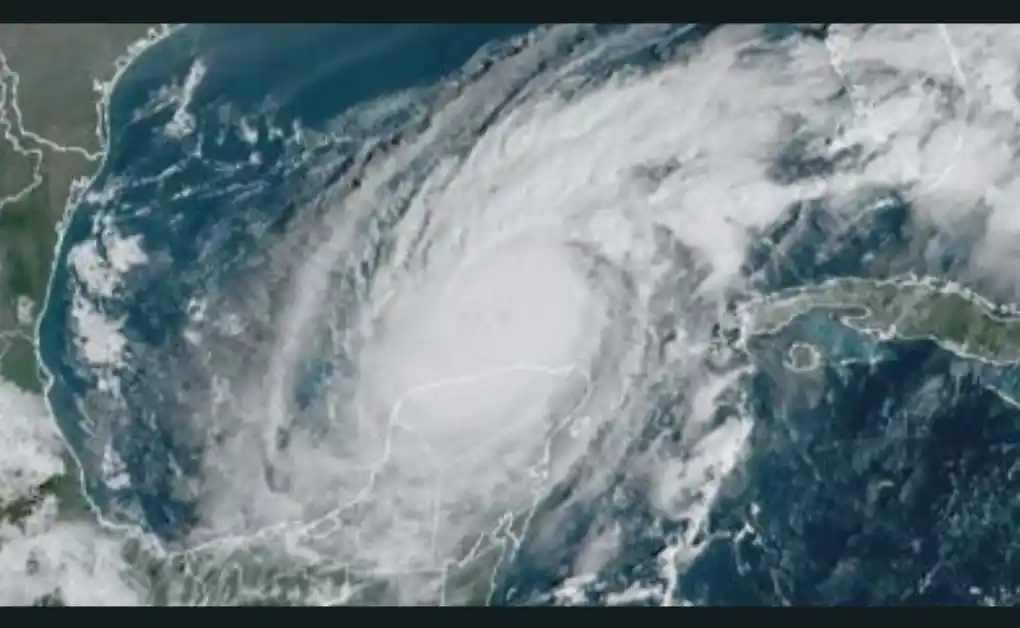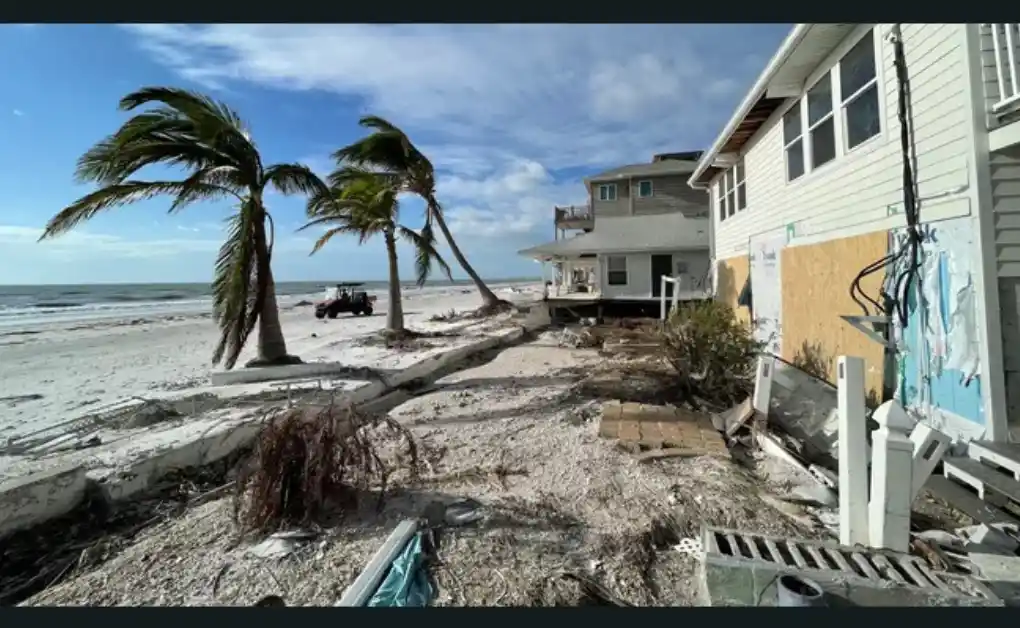As Hurricane Milton rapidly intensifies in the Gulf of Mexico, Florida is bracing for yet another hurricane in Florida. Initially expected to peak at Category 3, the storm has surprised forecasters with its rapid growth and is now set to become a powerful Category 4 hurricane before making landfall. The state is still recovering from the devastation of Hurricane Helene just weeks ago, and with the latest news predicting significant impacts from Hurricane Milton, residents along the Gulf Coast are preparing for life-threatening conditions.

Hurricane Milton Intensifies in the Gulf of Mexico
On Sunday, the National Hurricane Center upgraded Milton to a hurricane ahead of schedule due to its unexpected rapid intensification. By 8 p.m. ET, the storm was located approximately 780 miles from Tampa, with sustained winds reaching 85 mph. Forecasters now anticipate the hurricane will reach Category 4 strength, with winds up to 145 mph, by the time it makes landfall on Wednesday. The projected path shows Milton striking the west coast of Florida, with the impact zone stretching from north of Tampa to south of Fort Myers.
The tropical storm in Florida is expected to bring severe conditions, including dangerous storm surges, powerful winds, and heavy rainfall. These conditions will significantly affect areas already vulnerable from previous hurricanes and tropical storms in Florida this season.
Florida Prepares for Another Major Hurricane
With Hurricane Milton on a collision course with areas recently devastated by Hurricane Helene, Florida is gearing up for yet another intense weather event. Helene, a Category 4 storm, caused severe flooding and storm surge, and experts are warning that Milton could produce similar life-threatening conditions.
Emergency officials have urged Florida residents to finalize their preparations by Tuesday. “Residents need to be in a safe place and shelter in place by Wednesday,” said Michael Brennan, director of the National Hurricane Center. After making landfall, Milton is expected to cross the state and move into the Atlantic by Thursday, potentially impacting regions like Orlando, Florida and the eastern coast.
Evacuation Orders and State of Emergency Expanded Across Florida
As the storm approaches, evacuation orders are being implemented across the Gulf Coast. Several counties, including Manatee, Pasco, Pinellas, and Hillsborough, have issued mandatory evacuations for residents living in low-lying areas and mobile homes prone to flooding.
In Fort Myers Beach, which suffered extensive damage from past hurricanes such as Ian in 2022 and Irma in 2017, a full evacuation order has been issued, requiring residents to leave by Monday at 3 p.m. ET. Florida Emergency Management Director Kevin Guthrie noted that this could be the largest evacuation since Hurricane Irma, which saw nearly 6.8 million people fleeing their homes.

Governor Ron DeSantis has extended the state of emergency to 51 of Florida’s 67 counties, encompassing all of central Florida. This declaration activates the Florida National Guard and accelerates recovery efforts from Hurricane Helene’s aftermath. Meanwhile, a flood watch has been issued for central and south Florida, including cities such as Miami, Tampa, Palm Beach, and Orlando, and will remain in effect until Thursday.
Mexico Issues Hurricane Watch for the Yucatán Peninsula
As Milton strengthens in the Gulf, the government of Mexico has issued a hurricane watch for the north coast of the Yucatán Peninsula, from Celestún to Cabo Catoche. Forecasts predict a storm surge of up to 4 feet in some areas, prompting precautionary measures to ensure the safety of coastal communities.
Unusual Hurricane Activity in the Atlantic Ocean
Hurricane Milton’s emergence contributes to a remarkable trend in the 2024 Atlantic hurricane season. Storm researcher Philip Klotzbach noted that this is the first time in recorded history that there have been three simultaneous hurricanes in the Atlantic Ocean after September. Milton joins Hurricane Kirk and Hurricane Leslie, making it the ninth hurricane of the season and the fifth to form since September 25.
The surge in tropical storms and hurricanes in Florida has been linked to the unusually warm waters in the Gulf of Mexico, which have facilitated the rapid intensification of storms like Milton. Climate scientists have attributed these changes to human-caused climate change, resulting in more powerful, rainier, and unpredictable storms than in previous years.
Milton’s Arrival Follows Hurricane Helene’s Devastation
Florida is still reeling from Hurricane Helene, which struck less than two weeks ago and became one of the deadliest hurricanes to impact the U.S. since Hurricane Katrina in 2005. The storm left widespread destruction across multiple states, including Florida, Georgia, North Carolina, South Carolina, Tennessee, and Virginia. In Florida alone, at least 19 fatalities were reported due to catastrophic flooding and storm surges.
With the devastation of Hurricane Helene still fresh, the impact of Hurricane Milton on the already battered Gulf Coast could be even more severe, making the latest news of a hurricane in Florida especially concerning.
Preparing for Hurricane Milton: What Florida Residents Need to Do
As Hurricane Milton approaches, residents must take immediate steps to safeguard themselves and their properties. Here are some important measures to consider:
- Follow Evacuation Orders: If you live in a low-lying area, near the coast, or in a mobile home, heed evacuation orders promptly to ensure your safety.
- Prepare Emergency Supplies: Stock up on essential items, including bottled water, non-perishable food, medications, and first-aid supplies to last at least three days.
- Secure Your Property: Protect windows with storm shutters or plywood, and bring any outdoor furniture, grills, and other items indoors to prevent them from becoming projectiles.
- Plan for Pets: Make arrangements to take your pets with you if you evacuate. Ensure you have enough pet food and supplies for several days.
- Stay Informed: Monitor updates from the National Hurricane Center and local authorities for the latest information on the storm’s progress and potential impacts.
What Makes Hurricane Milton a Potentially Dangerous Storm?
Several factors contribute to Hurricane Milton’s threat level, including its rapid intensification, recent damage from Hurricane Helene, and the unusually warm waters of the Gulf of Mexico:
- Rapid Intensification: Milton has quickly gained strength, making it more dangerous when it reaches landfall. This rapid growth has caught some forecasters by surprise, as the storm has transitioned from a tropical storm to a major hurricane faster than expected.
- Previous Storm Damage: Many areas in the projected path are still recovering from Hurricane Helene’s recent devastation, leaving them more vulnerable to additional flooding and wind damage.
- Warm Gulf Waters: The Gulf of Mexico’s unusually high temperatures have fueled Milton’s intensification, resulting in stronger winds and more significant rainfall. The warm waters could continue to support the hurricane’s strength as it nears Florida’s coast.
- Unpredictable Path: Although current forecasts indicate that Milton will make landfall along Florida’s west coast, hurricanes can often change course unexpectedly. Residents across central and south Florida, including Orlando, should remain vigilant.
Heavy Storms Could Hit Late Monday or Tuesday
As Hurricane Milton approaches, heavy rain and high winds associated with the storm could begin impacting parts of Florida by late Monday or Tuesday. These conditions may extend well ahead of the hurricane’s centre, making it crucial for residents to complete preparations as early as possible. The latest news about the hurricane in Florida emphasizes the potential for life-threatening storm surges and significant inland flooding.
Florida’s West Coast and Central Florida at High Risk
Florida’s west coast, including cities such as Tampa, Fort Myers, and Orlando, is expected to experience the brunt of Hurricane Milton’s impacts. With the storm’s projected path encompassing a wide area, central Florida may face heavy rains, strong winds, and flooding, even if the hurricane does not make a direct hit on major cities. The state’s emergency response teams are coordinating evacuation efforts and preparing for widespread power outages and infrastructure damage.
Will the Hurricane Hit Orlando, Florida?
While Orlando is not directly on the coast, its central location means it could still experience the effects of Hurricane Milton, particularly in the form of heavy rain and strong winds. Inland areas can face serious flooding during hurricanes due to the sheer amount of water that comes with these storms. Residents are advised to stay alert and prepare for potential disruptions, even if the hurricane’s core does not pass directly over the city.
The Impact of the 2024 Hurricane Season on Florida
The 2024 hurricane season has already been notable for its intensity and frequency of storms affecting the region. The recent onslaught of hurricane storms highlights the challenges of living in a state prone to Gulf tropical storms. With Milton poised to strike Florida shortly after Helene, the state’s emergency management systems are being put to the test.
Conclusion
Hurricane Milton poses a significant threat to Florida as it approaches with Category 4 strength. The rapid intensification, combined with the state’s recent experience with Hurricane Helene, underscores the need for residents to take the storm seriously. Completing preparations, adhering to evacuation orders, and staying informed are essential for staying safe. As Florida faces back-to-back hurricanes, the growing intensity of storms like Milton reflects the impact of climate change on the frequency and severity of tropical storms and hurricanes in Florida. Meanwhile, the recent Baltimore bridge incident serves as another reminder of the importance of maintaining infrastructure safety, especially during extreme weather conditions. The state’s resilience will be tested once again as it braces for what could be another catastrophic event.
FAQs
When is Hurricane Milton expected to make landfall in Florida?
Hurricane Milton is projected to make landfall on Wednesday, affecting areas from north of Tampa to south of Fort Myers.
What strength is Hurricane Milton expected to reach before landfall?
Milton is forecast to intensify into a Category 4 hurricane, with sustained winds of up to 145 mph.
What areas are under evacuation orders?
Fort Myers Beach and parts of Manatee, Pasco, Pinellas, and Hillsborough Counties have issued mandatory evacuation orders for low-lying and flood-prone areas.
How does Hurricane Milton compare to Hurricane Helene?
While both storms are projected to reach Category 4 strength, Milton’s rapid intensification and potential impact on areas already hit by Helene make it a significant concern.
Why is the Gulf of Mexico contributing to stronger hurricanes?
The abnormally warm waters in the Gulf, attributed to climate change, are fueling the rapid intensification of hurricanes, making them more powerful and potentially more destructive.